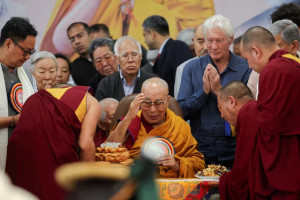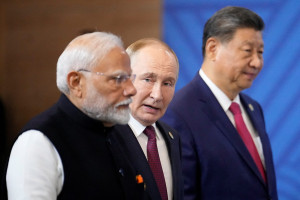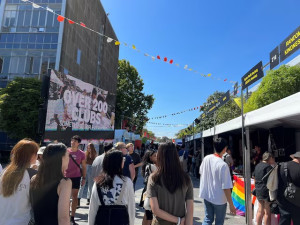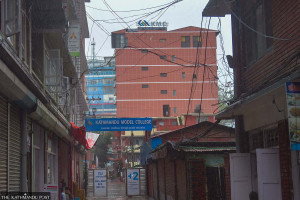World
Back on track
After an extremely long hiatus, musician Purna Nepali is all set to return to the stage, and the public’s consciousness, with a concert where he will be accompanied by the who’s who of the N
Anup Ojha
The bright lights, however, are beckoning him and Nepali is readying to get back in the spotlight with a new album built around nine new songs. The album, which will also include a clutch of his older numbers, will be released during a gala performance on March 21 at the Nepal Academy Hall, Kamaladi.
It's not that Nepali's quieter existence was one devoid of meaningful work. For well over three decades, he has been helping students at St Xavier's High School get acquainted with the art of the Nepali folk song and the intricate moves of the folk dances that have their origin in all corners of Nepal. He has also been devoting his time to archiving Nepali songs and overseeing the work done by the foundation he set up in 1995, Nepali Culture Conservation Centre (NCCC).
A few years ago two contemporary artistes, Rajesh Payal Rai, the adhunik singer, and Suresh Adhikari, composer and musician, came a-knocking. The duo, who view Nepali as a guru of sorts, had decided it was time to get the 60-year-old maestro back in the public's consciousness again, and thus was born the idea to get him to return to the stage once more.
Hiatus or no, it shouldn't be all that difficult for Nepali to perform for the crowds again. In his long career, there isn't a major venue or musical occasion that Nepali hasn't graced. His first and only solo performance was staged at the Mahendra Police Club in 1982, but he has collaborated on many musical shows with the nation's major artistes in the past. And besides working with them on live shows, Nepali also worked closely with many of the country’s musical luminaries. He worked hand in glove with the late Gopal Yonjan for close to 27 years, for instance ; he would exchange pointers on his art and craft with the veteran Amber Gurung; and he spent countless hours at the late Narayan Gopal's house practicing in the Swor Samrat's chambers.
So respected was Nepali in the yesteryears that he was handpicked by the palace to be a music and dance teacher to the younger members of the Royal family—the late Dipendra Shah and Nirajan Shah and Shruti Shah—and he even taught Paras Shah. During his heyday, he also taught policemen at the Mahendra Police Club—during a tenure that lasted for over 12 years. The highlight of these years, when he enjoyed political patronage and national recognition, occurred during the eighth SAF Games, in 1999, where he choreographed the groups of dancers who took the field during the event's opening and closing ceremonies.
It's surprising then that when Rajesh Payal Rai and Suresh Adhikari pushed the idea for the upcoming show and when they asked Nepali to scout for possible sponsors, he couldn't find a willing backer. Most organisations and companies that he and the representatives from NCCC met with were bascially hesitant to support an aging artiste. In fact, at many
of these places, the people in the marketing departments didn't even know who he was. Finally, the people at Rara Noodles, many of whom have been fans of Nepali’s through the years, got on board with the project.
The idea's reception among the music fraternity, however, couldn't have been any more different. When word got around that Nepali was trying to get up on stage again, and produce a new album, contemporary musicians rallied around the veteran musician and it wasn't difficult for him to strike up partnerships with many of them. Nepali's presence might have dimmed among the general populace, but the local musicians have always held him in high regard. Thus the show will feature everyone from Rajesh Payal Rai, Ram Krishna Dhakal and Adrian Pradhan, to Junu Prasai and Shiva Pariyar. The album, on the other hand, will comprise songs on which many of the current popular lyricists have lent their talent: Chetan Karki, Lokmani Adhikari and a host of others.
Maybe because Nepali is today surrounded by such a youthful cast of artistes, as they practice with him in the studios around town, the maestro is confident that he will, as he likes to put it, be a youngster up on stage who will have the youngsters of today jiving to his always-popular numbers such as Khutta ma Nel Pare Parla and Ye Bhena Ye Sala. Or maybe that's just seasoned opinion from an artiste who never stopped working on his art.




 23.46°C Kathmandu
23.46°C Kathmandu.jpg)















